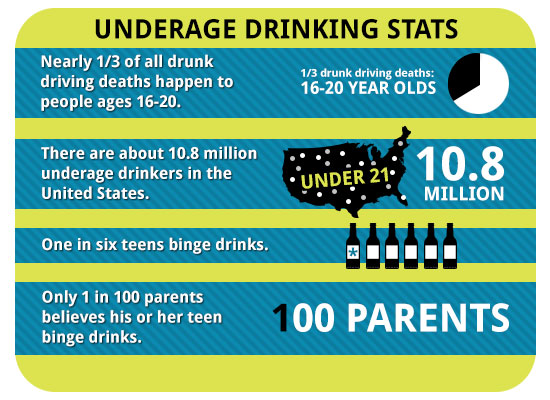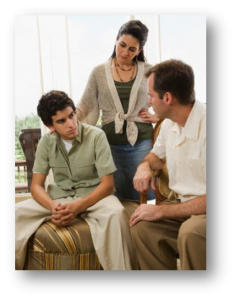Six Things To Do When You Learn Your Teen is Drinking
 Recent reports state 22% of high school seniors binge drink (5+ drinks in a short amount of time). So what does that mean? Using the 2013 Census to get an approximation of high school seniors, the total current population of seniors is 3,960,000, approximately. If 22% of these seniors are binge drinking, that's 871,200 high school seniors who binge drink. If you divided this evenly among the 50 states–which is obviously not a statistically accurate measure of high school seniors per state because of great differences in population–to get an idea, that comes to 17,424 seniors binge drinking per state. When you consider the negative affects alcohol can have: on an individual's future, their family, accidents and deaths due to drunk driving, any amount of drinking is of concern, but 1/5 of the graduating class binge drinking? That's alarming. And if you look at the graph, this number doubles for all underage drinkers.
Recent reports state 22% of high school seniors binge drink (5+ drinks in a short amount of time). So what does that mean? Using the 2013 Census to get an approximation of high school seniors, the total current population of seniors is 3,960,000, approximately. If 22% of these seniors are binge drinking, that's 871,200 high school seniors who binge drink. If you divided this evenly among the 50 states–which is obviously not a statistically accurate measure of high school seniors per state because of great differences in population–to get an idea, that comes to 17,424 seniors binge drinking per state. When you consider the negative affects alcohol can have: on an individual's future, their family, accidents and deaths due to drunk driving, any amount of drinking is of concern, but 1/5 of the graduating class binge drinking? That's alarming. And if you look at the graph, this number doubles for all underage drinkers.
The truth remains however, that alcohol is easily available to children in nearly all grade levels. In fact, alcohol is available to children as young as 10 years old. Therefore, the problem doesn't lie in the inability to obtain alcoholic beverages, but the test is that of the actual choices that your teenager will be forced to make. Once a teen makes a choice, there may be little parents, or adults, can do about the choices that their teen will directly make–because once they are made, they are made–but parents can have a strong influence in their children's lives by simply being an example. Your teenager will closely observe your attitude or position on alcohol, and chances are good that if you have accepted it into your life - they will too.
There are three basic areas that can be considered the causes of drinking. They are the areas of social, friendship, and personal identity. "Socially, experimenting with drinking creates an immediate niche for the teenager. At a time when fitting in is crucial, alcohol temporarily resolves any questions of acceptance" (Riera, p.94). Drinking can bring a false sense of identity to a teenager. Often times they feel as if they can only share their true feelings when they are drinking or drunk. They recognize that if someone is to mock them for being what they want to be, they can simply blame their actions on being intoxicated. The choice to go against parental guidelines might also be an assertion of independence and autonomy.
Dr. Krisiti Kleinschmit a physician at the University of Utah's Neuropsychiatric Institute and an expert in child and adolescent psychiatry, states that teenagers' brains are still developing–which means that the part of the brain used for decision making, and anticipating and understanding consequences of decision making, is still underdeveloped. So if teenagers begin drinking, they can potentially limit their brain growth–and decision making abilities. So what can parents do if they discover their teen is drinking? First, a few things to NOT do when you find out.
Ways to help teens make good decisions.
What Not To Do
1. Do not be surprised if your teen "messes up" after committing to you.
As a parent of teenager, you must realize that young adults are going to make mistakes. It is important that you recognize when teenagers commits themselves to you, they probably do have good intentions. However, peer pressure and controversial situations play a big part of a teenager's life. Help her to correct her behavior once again, with possibly even a stricter consequence, but do not pull away is shock and dismay when she tells you that she has tried alcohol again.
2. Do not overreact in an inappropriate manner if you learn of his drinking.
Panicking, or losing your sense of control, is something that will help to make the matter only worse. When you learn of your teenager's drinking for the first time, you should approach him in a very mature manner by asking him to explain the situation to you. Try and determine the extent of your teenager's drinking, which will help you to define any action that you might need to take.
3. Don't pretend that there is not a problem.
Accepting the fact that there is a problem is the first step in helping your teenager to overcome her problem. Do not be embarrassed to look into early intervention programs that could truly be beneficial to the both of you.
What To Do
1. Discuss alcohol with your teen.
"Adolescents look and test for congruency. In your conversations on this topic, clearly outline your position on alcohol; acknowledge the reality of the adolescent world; and discuss possible consequences of broken agreements. Again, let the consequences speak for themselves so that alcohol use doesn't turn into a power struggle later" (McMahon, p.167).
2. Make yourself a resource to your teenager by providing him a "way out."
Help your teenager learn how to say no to his friends, but do not leave him alone in his efforts. Occasionally, he might need to blame you for not allowing him to go out with his friends, or even for participating in drinking. This might take some pressure off of your teenager for a time, but help him to realize that his friends will need to know his own personal standards in order for them to understand his actions completely.
3. Remember that health and safety are the bottom line.
"No matter what poor decisions have been made, what rules have been violated, or what lies have been told, teenagers must know deep in the marrow of their bones that their overall safety far outweighs all other concerns." (Riera, p.105)
4. Find out why your teenager is involved with alcohol.
Find out why your teenager feels a need to drink alcohol in social situations. Her reasons might go beyond what you possibly assumed, so it is important to allow her to speak to you openly about it.
5. Set an example.
By setting an example, you show your teenager that alcohol abstinence really does mean a lot to you in your life. Many teenagers have stopped drinking simply because their parents stopped drinking with them.
6. Seek professional help if the problem continues.
The problem might be severe enough that it is literally out of your hands. If you feel that no progress is being made, allow someone to assist you in your efforts to help your teenager.
References
McMahon, T. (1996). Teen tips. New York: Pocket Books.
Riera, M. (1995). Uncommon sense for parents with teenagers. Berkeley, CA: Celestial Arts.
 RSS Feed
RSS Feed